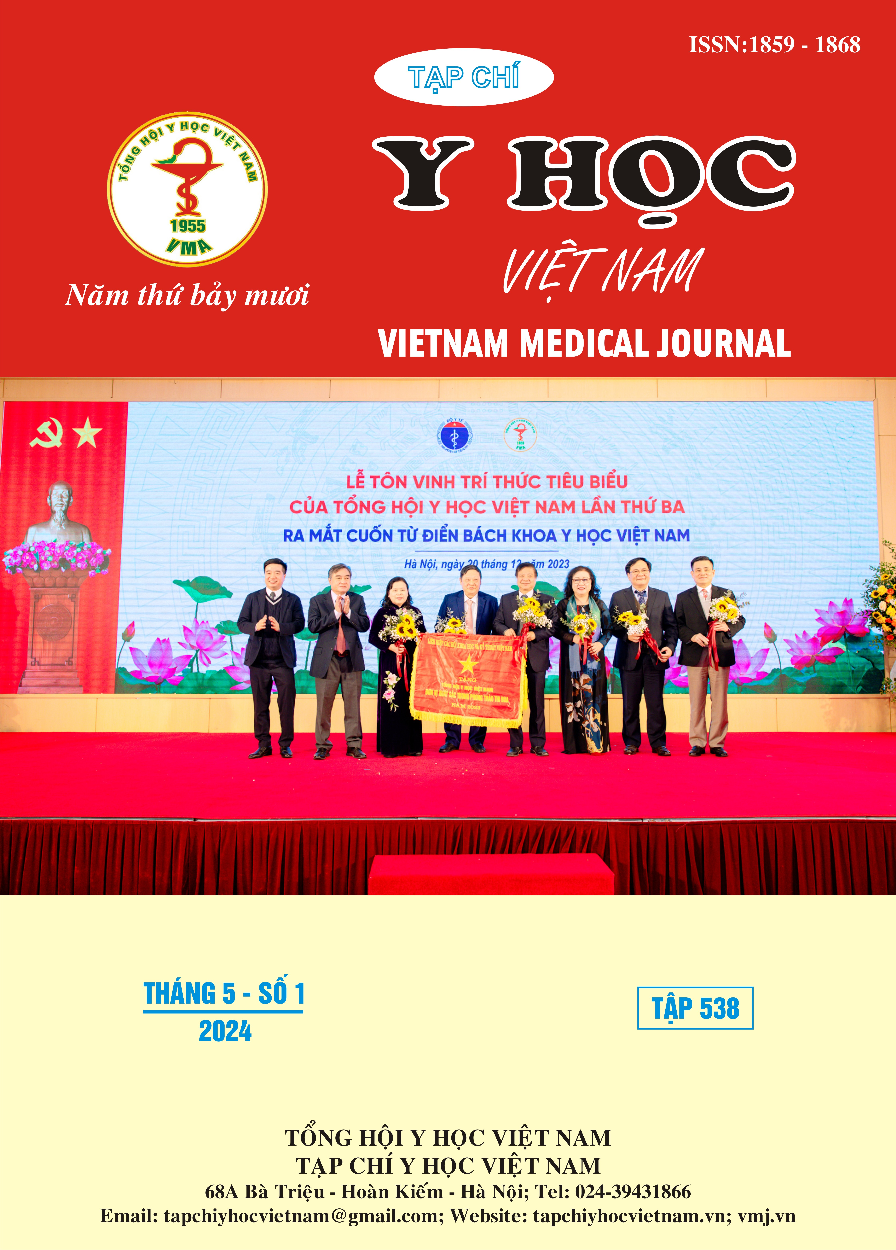TỶ LỆ RỐI LOẠN NHẬN THỨC Ở NGƯỜI CAO TUỔI SAU GÂY TÊ TỦY SỐNG TRONG PHẪU THUẬT THAY KHỚP HÁNG VÀ KHỚP GỐI
Nội dung chính của bài viết
Tóm tắt
Đặt vấn đề: Rối loạn nhận thức sau phẫu thuật ở người cao tuổi ảnh hưởng nhiều đến chất lượng hồi phục sau phẫu thuật, tăng biến chứng nhiễm trùng, tăng biến chứng hô hấp, kéo dài thời gian nằm viện, giảm chất lượng cuộc sống, tăng chi phí chăm sóc y tế. Mục tiêu: Xác định tỷ lệ rối loạn nhận thức ở người cao tuổi sau gây tê tủy sống trong phẫu thuật thay khớp háng và khớp gối trong 5 ngày đầu hậu phẫu. Đối tượng và phương pháp nghiên cứu: Người bệnh cao tuổi (≥ 60 tuổi) được gây tê tủy sống phẫu thuật chương trình thay khớp háng và khớp gối. Nhận thức người bệnh được đánh giá bằng thang điểm đánh giá tình trạng tâm thần kinh tối thiểu trước phẫu thuật 1 ngày và 5 ngày đầu hậu phẫu. Thiết kế phương pháp nghiên cứu quan sát dọc, tiến cứu và phân tích dựa trên phân tích sống còn với sự xuất hiện rối loạn nhận thức trong 5 ngày đầu hậu phẫu. Kết quả: 22,5% người bệnh cao tuổi rối loạn nhận thức sau phẫu thuật chương trình thay khớp háng và khớp gối được gây tê tủy sống trong 5 ngày đầu phẫu thuật. Phân tích hồi quy Cox đa biến có 3 yếu tố nguy cơ là sử dụng midazolam an thần trong phẫu thuật (p= 0,002), truyền máu chu phẫu trên 2 đơn vị (p = 0,01) và mức độ đau trung bình ngày thứ 1 (p = 0,008). Kết luận: Nghiên cứu phân tích 107 người bệnh ghi nhận tỷ lệ rối loạn nhận thức trong 5 ngày đầu hậu phẫu là 22,5% (24 người bệnh) diễn ra trung vị 2 ngày sau phẫu thuật. Có 3 yếu tố nguy cơ rối loạn nhận thức sau phẫu thuật là sử dụng midazolam an thần trong phẫu thuật, truyền máu chu phẫu trên 2 đơn vị và mức độ đau trung bình ngày thứ 1.
Chi tiết bài viết
Từ khóa
Rối loạn nhận thức sau phẫu thuật, người cao tuổi.
Tài liệu tham khảo
2. Deo H, West G, Butcher C, et al. The prevalence of cognitive dysfunction after conventional and computer-assisted total knee replacement. Knee. Mar 2011;18(2):117-20.
3. Ehsani R, Djalali MS, Zaman B, et al. Effect of General Versus Spinal Anesthesia on Postoperative Delirium and Early Cognitive Dysfunction in Elderly Patients. Anesth Pain Med. Aug 2020;10(4):e101815.
4. Zhu SH, Ji MH, Gao DP, et al. Association between perioperative blood transfusion and early postoperative cognitive dysfunction in aged patients following total hip replacement surgery. Ups J Med Sci. Aug 2014;119(3):262-7.
5. Gao B, Zhu B, Wu C. Preoperative Serum 25-Hydroxyvitamin D Level, a Risk Factor for Postoperative Cognitive Dysfunction in Elderly Subjects Undergoing Total Joint Arthroplasty. Am J Med Sci. Jan 2019;357(1):37-42.
6. Zhang H, Zheng J, Wang R, et al. Serum Phosphorylated Neurofilament Heavy Subunit-H, a Potential Predictive Biomarker for Postoperative Cognitive Dysfunction in Elderly Subjects Undergoing Hip Joint Arthroplasty. J Arthroplasty. Aug 2019;34(8):1602-1605.
7. Li WX, Luo RY, Chen C, et al. Effects of propofol, dexmedetomidine, and midazolam on postoperative cognitive dysfunction in elderly patients: a randomized controlled preliminary trial. Chin Med J (Engl). Feb 2019;132(4):437-445.
8. Paul P-AvK. Procedure-specific acute pain trajectory after elective total hip arthroplasty: systematic review and data synthesis. British Journal of Anaesthesia. 2021;127(1):110 - 132.


